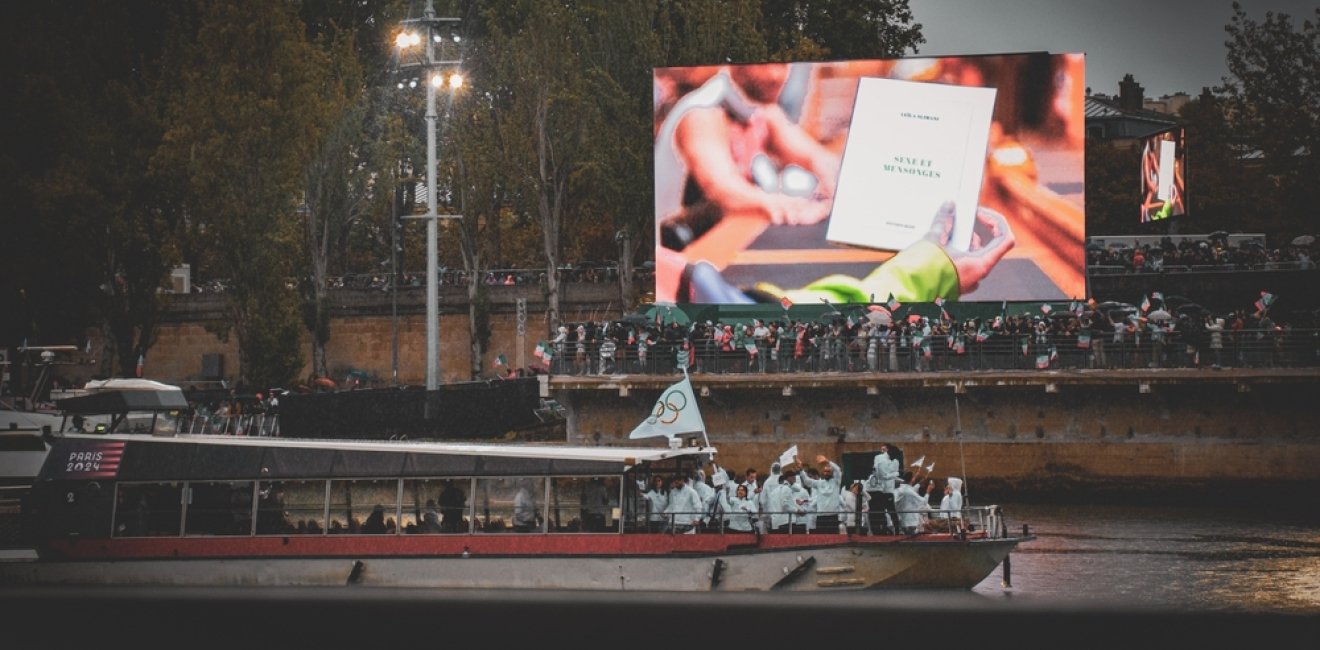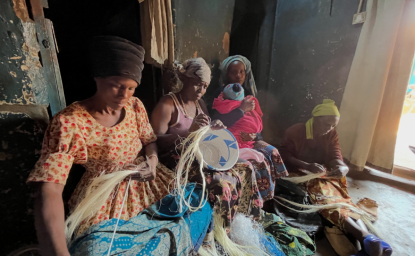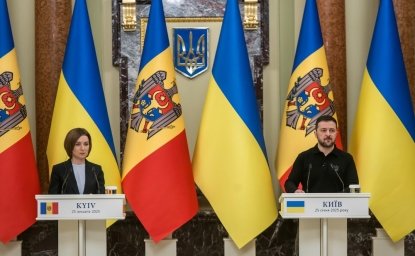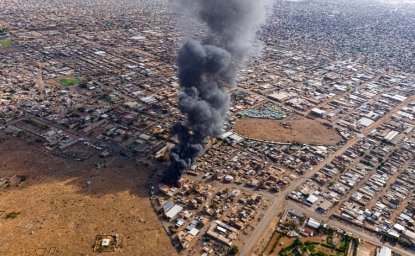As forced displacement continues to increase in scope, scale, and complexity, participation of displaced people in decisions that affect them must be part of finding sustainable solutions to their plight. The Global Compact on Refugees states that responses to refugee situations “are most effective when they actively and meaningfully engage those they are intended to protect and assist.” The appointment of Masomah Ali Zada to the International Olympic Committee (IOC) Athletes’ Commission and her role as Chef de Mission for the Refugee Olympic Team presents an opportunity to establish an evidence base for the positive impact of meaningful refugee participation. It also offers lessons for governance across the global refugee regime.
The 2024 Olympic Games in Paris broke records in many ways: 125 Olympic records and 32 world records were set across the 19 days of competition; nearly 10 million tickets were sold and 1,044 medals were awarded; and it was the first Olympic Games featuring full gender parity.
Amid these impressive figures, some other memorable firsts were recorded. The Refugee Olympic Team won its first Olympic medal when Cameroonian refugee and boxer Cindy Ngamba captured bronze in Women’s 75 kg boxing. In addition, two sisters—Yuldoz Hashimi and Fariba Hashimi—made history as the first cyclists to represent Afghanistan at the Olympics despite their refugee status. Another Afghan cyclist, Masomah Ali Zada, made history as the first refugee appointed to the IOC Athletes’ Commission. She also served as the first refugee Chef de Mission for the Refugee Olympic Team.
Besides representing more than 122 million forcibly displaced people, the participation of refugees in the Olympic Games amplified these athletes’ stories and presented them not as bystanders to the events that displaced them, but as people with great talents, skill, and agency. Such visible storytelling creates a window through which policymakers can understand the plight of forcibly displaced people. However, generating empathy and spotlighting refugee stories cannot be an end in itself. These efforts must translate into the meaningful participation of refugees in the decision-making processes that affect them.
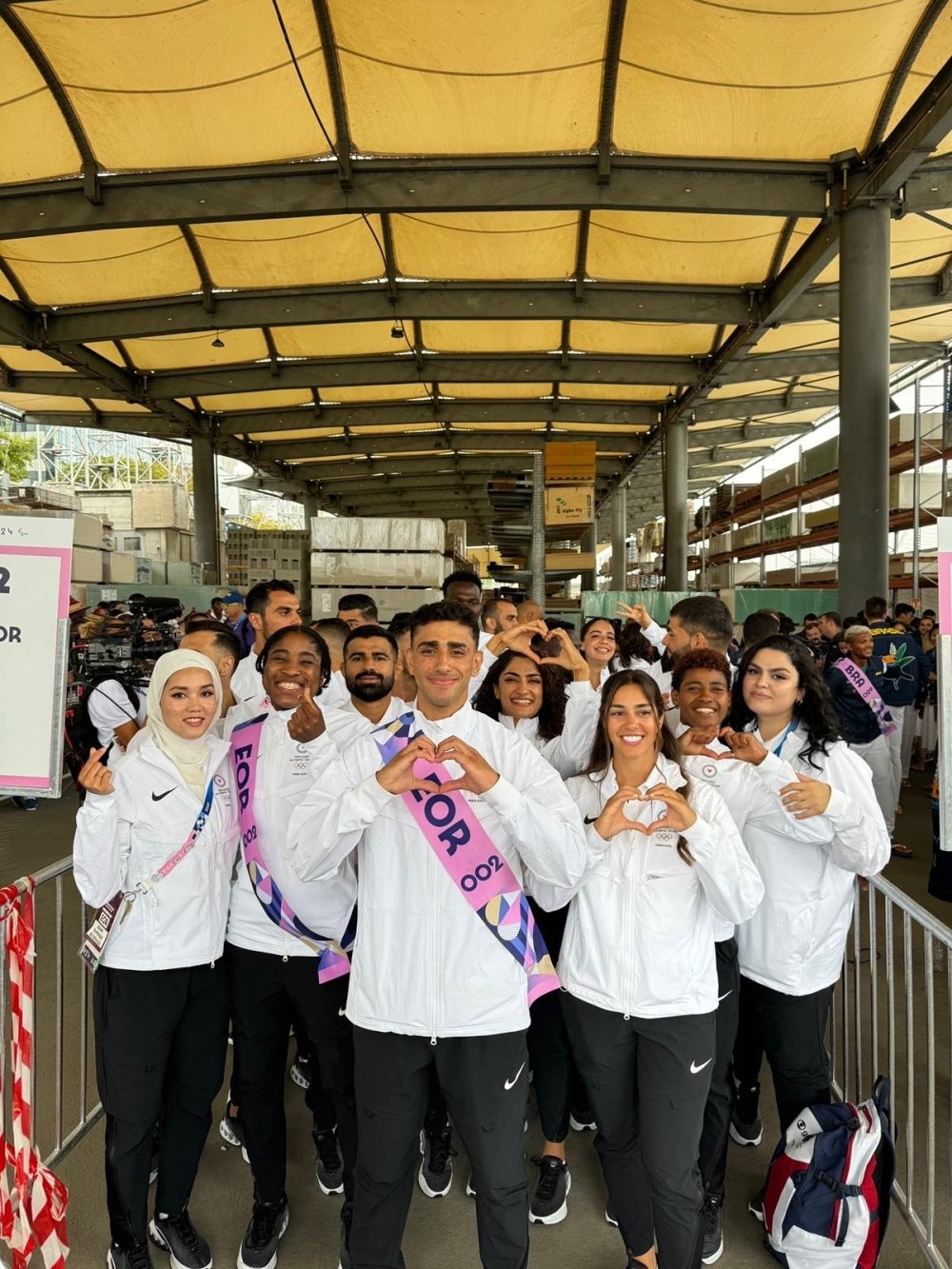
The Athletes’ Commission and its Responsibilities
The IOC Athletes’ Commission is a body of current and former Olympic athletes serving as a link between athletes and the International Olympic Committee. Since its inception in 1981, the Athletes’ Commission underwent many transformations to become more representative of athletes and more involved in the IOC decision-making structure. Originally, the IOC President appointed all members of the commission. Participation in the decision-making processes of the IOC was not part of their mandate; the commission’s role was largely symbolic and lacked involvement from current athletes.
After scandals surrounding the Tour de France in 1998 and the Salt Lake City Olympic Games, the IOC faced public pressure to increase transparency and restore credibility to the Olympic decision-making structure. Thus, proposals generated by the IOC 2000 Commission and the Reform Agenda 2000 evolved the Athletes’ Commission into its current form. Throughout the reform process, commission members proposed and approved of 50 recommendations including rules for the selection of host cities, total events for future Olympic Games, support for the World Anti-Doping Agency (WADA), and the composition of the IOC. This last point led to reforms such as the inclusion of athletes as IOC members, the election of Athletes’ Commission leadership by athletes, and a seat for the commission chair on the IOC Executive Board. While most Athletes’ Commission members are now elected by fellow Olympians, the IOC President still appoints a minority of members, with equal voting power, to ensure diversity and balance. The IOC President appointed Masomah Ali Zada in 2022.
The appointment of Masomah Ali Zada signaled a shift towards greater inclusion and representation of refugees in IOC decision-making. The commission “is representative of all athletes and their voices, and it is an honor to be the voice of the refugee athletes,” said Ali Zada in an interview with the author. Though her identity as a refugee was previously unrepresented by the commission, she acclimated to the role well. “At the beginning when I started to work with the IOC Athletes’ Commission, I found a friendship between athletes and a lot of respect,” she recalled. “When we talk, it’s not just that [IOC members] hear us – they hear, respect, and analyze, and then take action.”
The close relationship between the IOC and the Athletes’ Commission is built into the IOC Athletes’ Commission Regulations. For example, Regulations 1.2 through 1.5 detail the ways in which the Commission has both advisory and decision-making power within the IOC. Regulations 1.1 and 1.7 also explain that “the Commission’s effective functioning depends on broader respect for athlete representation,” and that “the Commission is responsible for ensuring that its views…are informed by meaningful consultation with athletes.” Ali Zada developed close relationships with her fellow refugee athletes from the start of her appointment. She prioritized being present for her teammates, not only to gather feedback and propose changes with the Athletes’ Commission, but also to be a source of knowledge and encouragement for her team. She made every effort to “discover [refugee athletes’] stories and unique perspectives.” In doing so, she became the link between refugee athletes and the IOC decision-making processes that govern them.

Role and Impact of Masomah Ali Zada as Athletes’ Commission Member and Chef de Mission
Informed by the perspectives she gathered and her own lived experience, Ali Zada contributed to many of the Athletes’ Commission’s key achievements. These included a new IOC Mental Health Action Plan, engagement with various National Olympic Committees (NOCs), the first-ever medal reallocation ceremonies, and innovations to the Olympic Village such as a nursery for new athlete parents. The Commission also oversaw new athlete engagement activations – benefits presented to Olympic athletes originating from The Olympic Partner (TOP) sponsors. One impactful activation was a partnership with Airbnb to help cover the cost of travel for Olympic and Paralympic hopefuls. This partnership led to 60 refugee athletes receiving grants to prepare for the 2024 Olympic Games.
The mental health of refugee athletes is a major area of focus for Ali Zada. Battling for cultural acceptance in Afghanistan, navigating the Tokyo Olympic Games as a refugee and a full-time student, and experiencing the stress of elite athletic competition severely impacted her mental wellbeing in 2020. Empowered by her multiple leadership roles, she uses her lived experience to connect with those who have faced similar challenges and to advocate for their mental health needs.
In addition to her responsibilities as an Athletes’ Commission member, Ali Zada also serves as an Athlete Representative of the IOC Mental Health Working Group. In this role, Ali Zada was instrumental in conveying the athlete perspective related to the proposal and implementation of new mental health resources by the IOC for Olympic athletes in 2024. Alongside Abhinav Bindra, Vice-Chair of the IOC Athletes’ Commission and IOC Mental Health Ambassador, Ali Zada oversaw the development of a new eLearning course on the Athlete365 platform aimed at promoting mental fitness, the expansion of a dedicated mental health helpline operating at all hours of the week in 70 languages, and the distribution of comprehensive mental health guidelines for International Federations (IFs) and National Olympic Committees (NOCs) to promote mental wellbeing in their athletes. With Ali Zada’s input, the IOC’s Medical and Scientific Department and the Athlete’s Department developed the Athlete365 Mind Zone – a first-of-its-kind space in the Olympic Village dedicated to athletes’ mental wellbeing offering “a range of evidence-based mindfulness activities…focused on preparation for competition.” Its services were provided to over 2,000 athletes and entourage members.
The expertise she gained from her lived experience as a refugee athlete also benefits the Refugee Olympic Team in a competitive context. Looking forward to the 2028 Olympic Games in Los Angeles, Ali Zada hopes to improve the training resources and opportunities they are provided. “I really love this position because I can work directly with athletes and be very close to them,” said Ali Zada. However, “it is really difficult to manage the team because the athletes live in different countries.” Not only are members of the Refugee Olympic Team located far away from each other geographically, but they also face cultural and linguistic barriers. As a competitor in 2020, Ali Zada felt siloed and had difficulty making connections across the team. As Chef de Mission, she aims to develop a sense of unity that may not have existed before by coordinating centralized training opportunities ahead of the 2028 Olympic Games. On the Athletes’ Commission, she will encourage them to “continue to develop programs, offer support for athletes at the Games, and leverage our partners and other resources [to support refugee athletes].”
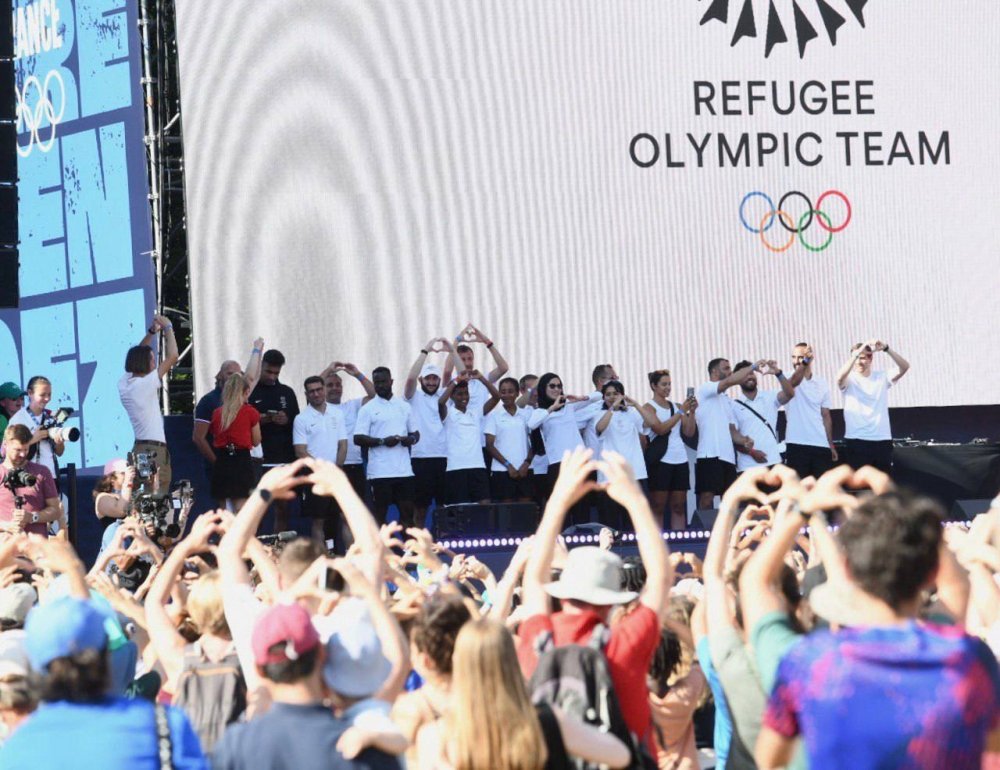
Meaningful Participation of Refugees and Lessons Learned Beyond Sports
What can Masomah Ali Zada’s example tell policymakers about the positive impact that refugees can have on decision-making processes? As the first refugee to be Chef de Mission of the Refugee Olympic Team, Ali Zada showed that refugees are the foremost experts on their own lived experience. Before the Olympic Games and during her time in the Olympic Village, she served as a constant resource for her team and an effective communicator of their needs to the IOC. The combination of her lived experience as a refugee athlete and her expertise as a veteran Olympian were essential to gaining the trust of her teammates, which then allowed her to effectively fulfill her duties as Chef de Mission and her mandate as an Athletes’ Commission member.
Ali Zada’s example shows policymakers that expertise gained from lived experience better informs the decisions that govern refugees and non-refugee athletes alike. Without Ali Zada’s perspective, initiatives such as the Athlete365 Mind Zone may not have been as fully responsive to the diverse backgrounds of athletes seeking their services. With her input and oversight, these initiatives were positively received by a vast majority of athletes. Investing in refugee talents and empowering refugee voices yields positive impacts for all people.
When discussing peacebuilding beyond the Olympic Games, Ali Zada embodied a combination of pragmatism and optimism that speaks to her resilience. “If I was not an athlete, who would invite me to talk about peace?” Still, the lessons of her leadership, which “brought together athletes from diverse backgrounds under one flag…[to foster] belonging and peace,” are not confined to the realm of sport. Just as she and other members of her team came from all around the world, the building of peace can come from many different angles.
With the spotlight on her team, Ali Zada hopes to reach a new generation of peacebuilders who may be inspired by their story. “[Today’s] policymakers, they already know [about issues affecting refugees] but they don’t do anything,” she explained. “It is more important to speak to the younger generation who will listen and become the next policymakers.” When Ali Zada speaks to young people, she feels hopeful for the future – hopeful that one day, “every human [can enjoy] the right to live in peace,” and ultimately, hopeful that “in the future, there is no need for a Refugee Olympic Team.”
Author


Refugee and Forced Displacement Initiative
The Refugee and Forced Displacement Initiative (RAFDI) provides evidence-based analyses that translate research findings into practice and policy impact. Established in 2022 as a response to an ever-increasing number of people forcibly displaced from their homes by protracted conflicts and persecution, RAFDI aims to expand the space for new perspectives, constructive dialogue and sustainable solutions to inform policies that will improve the future for the displaced people. Read more



